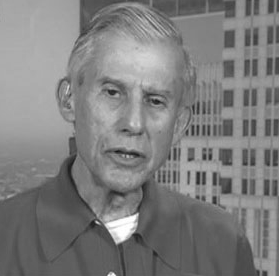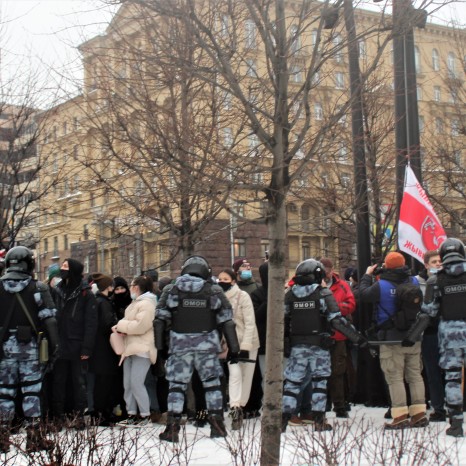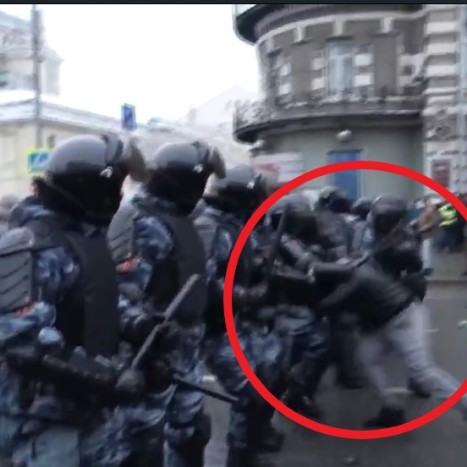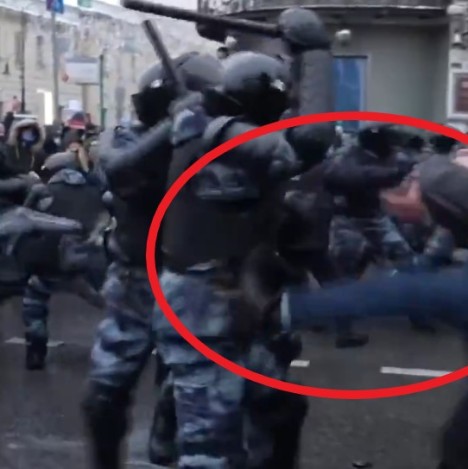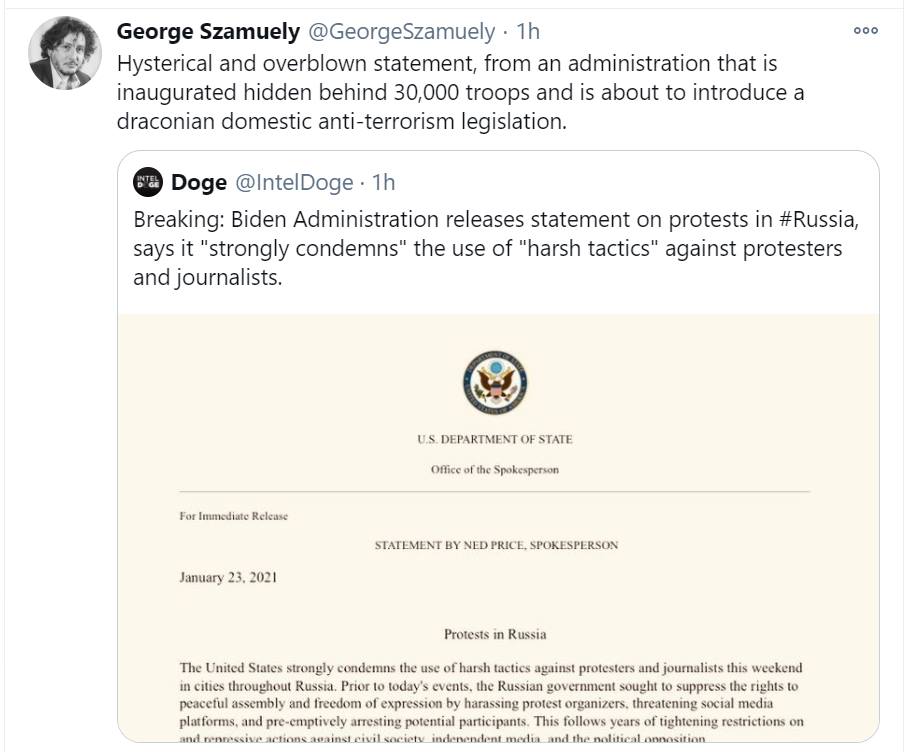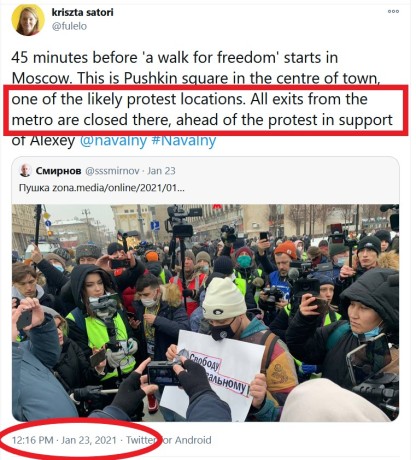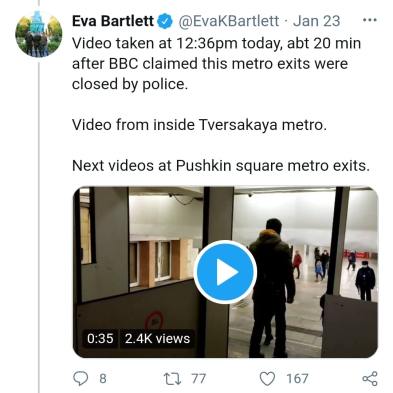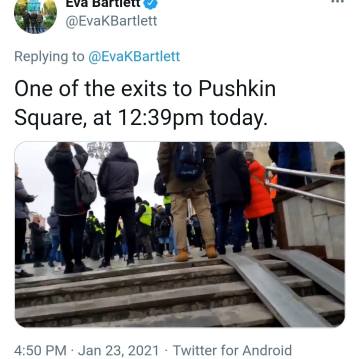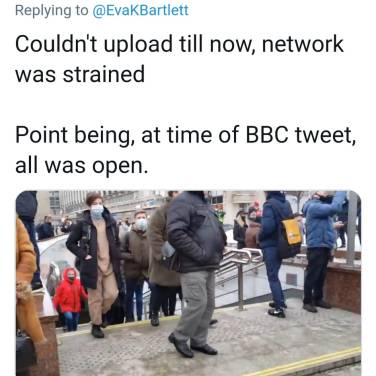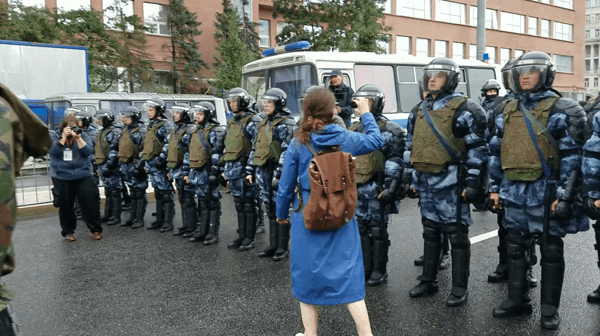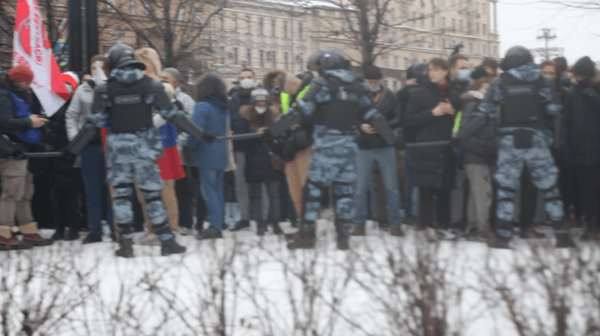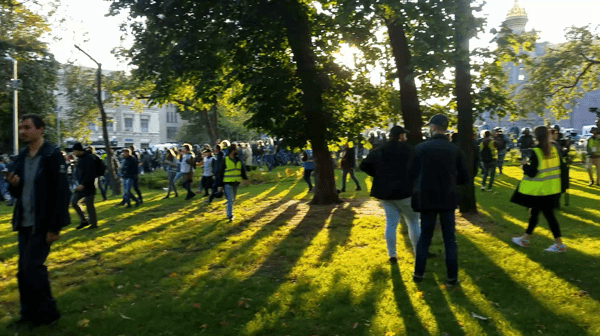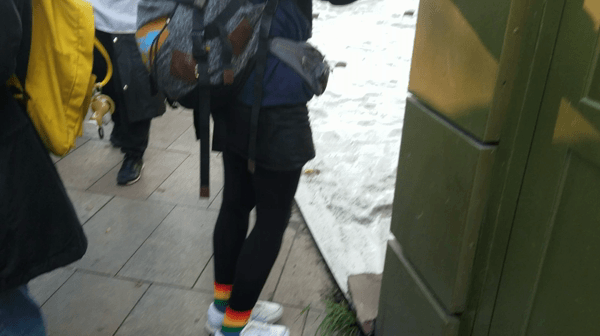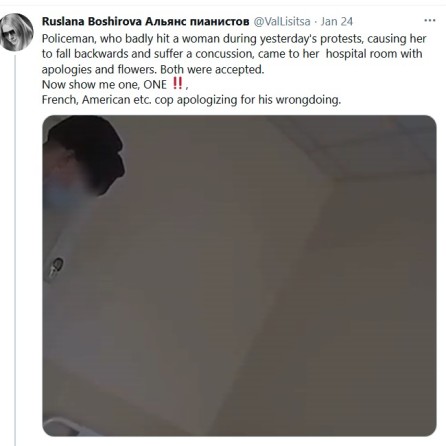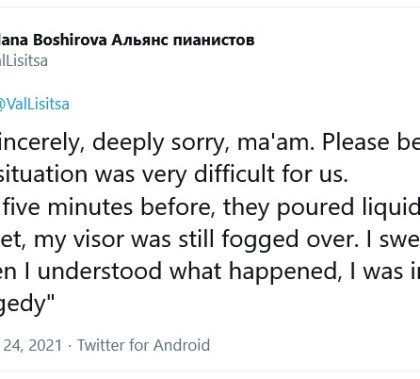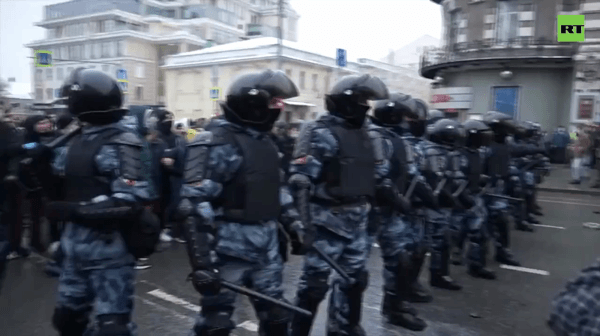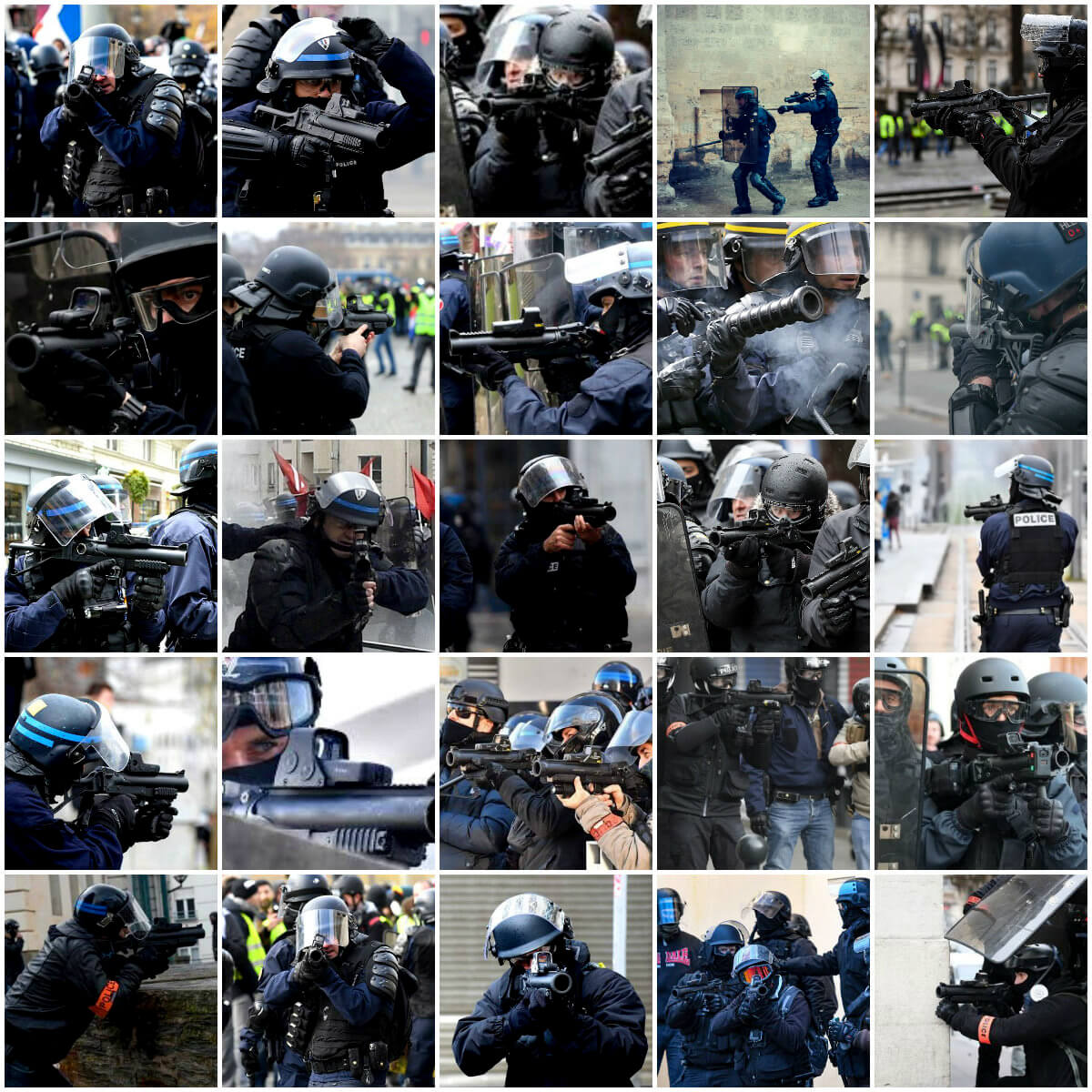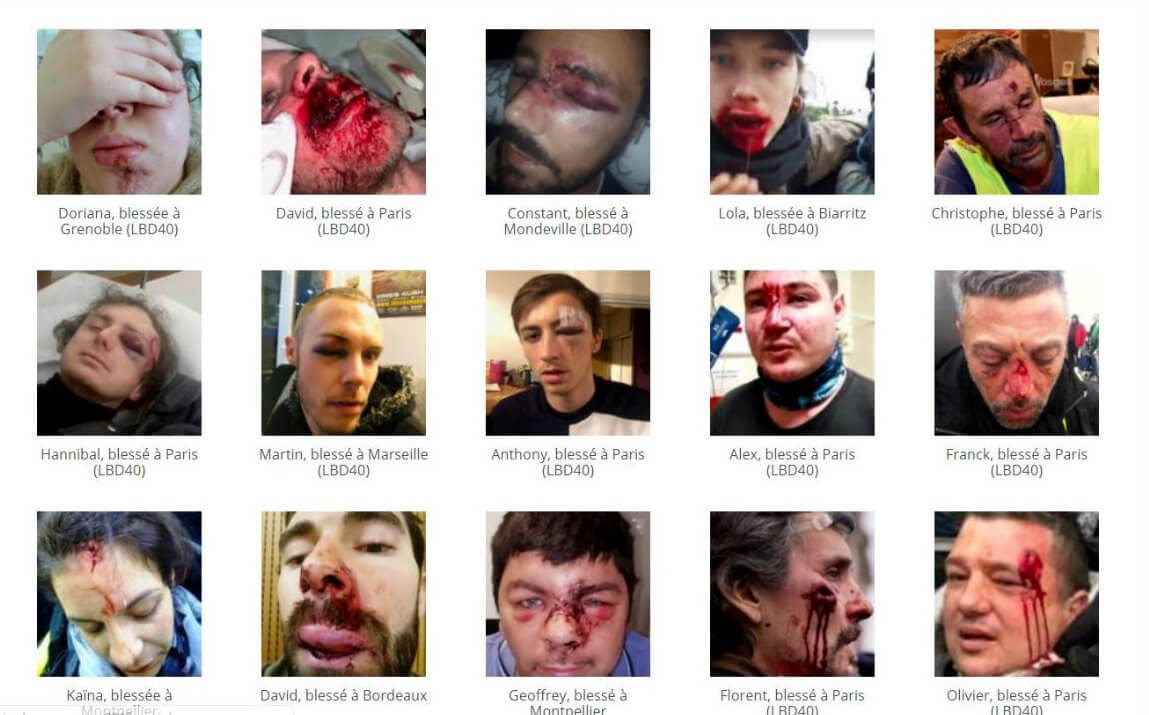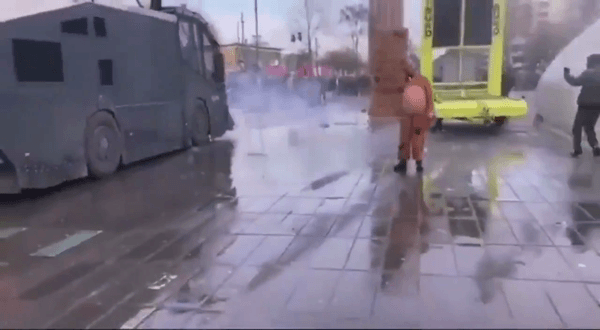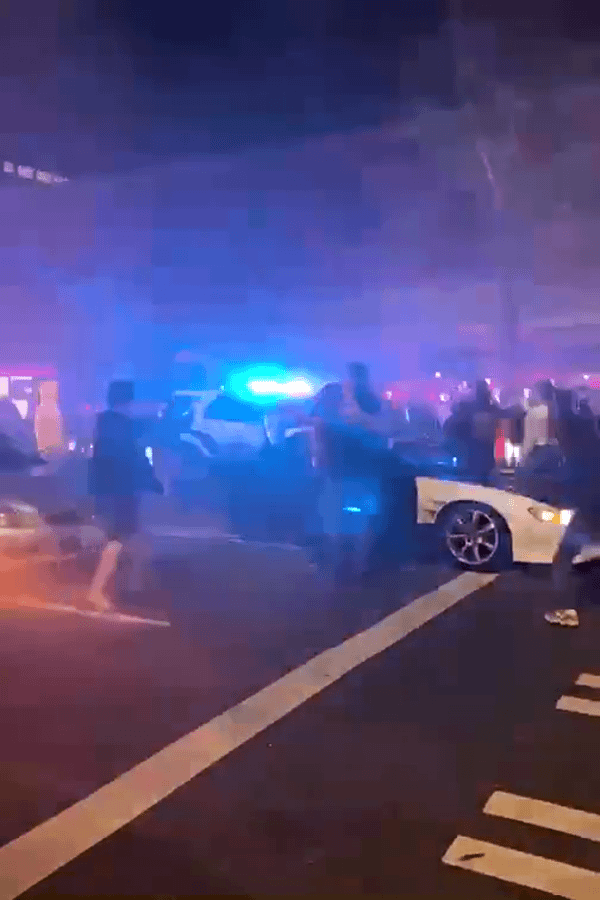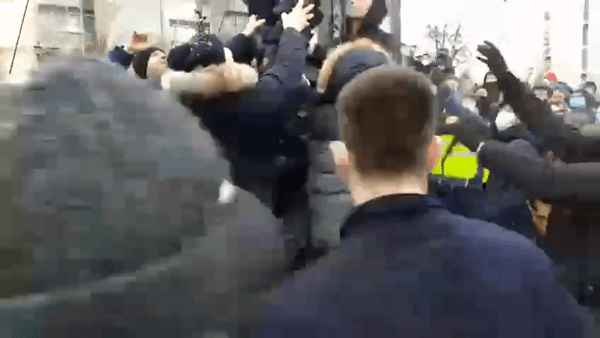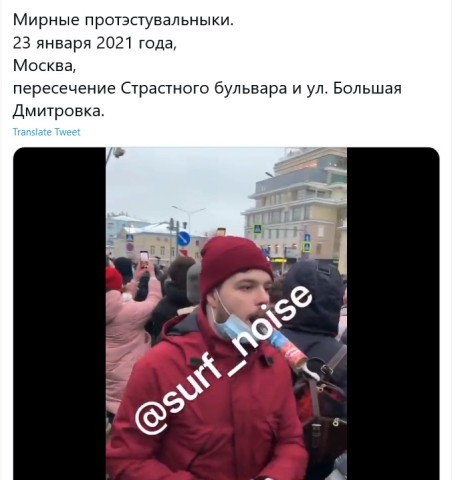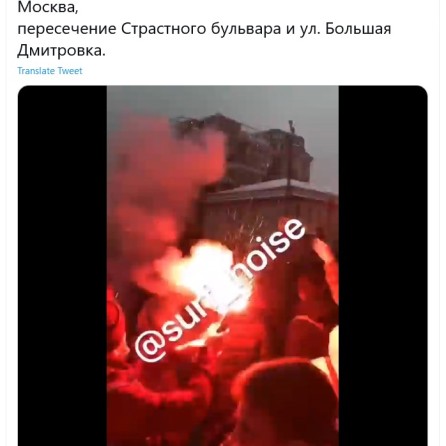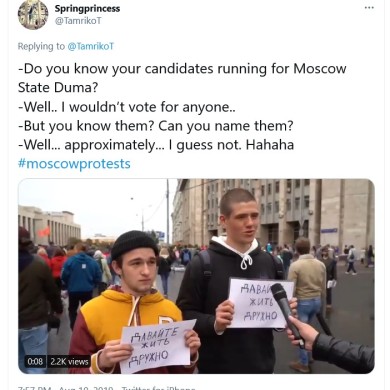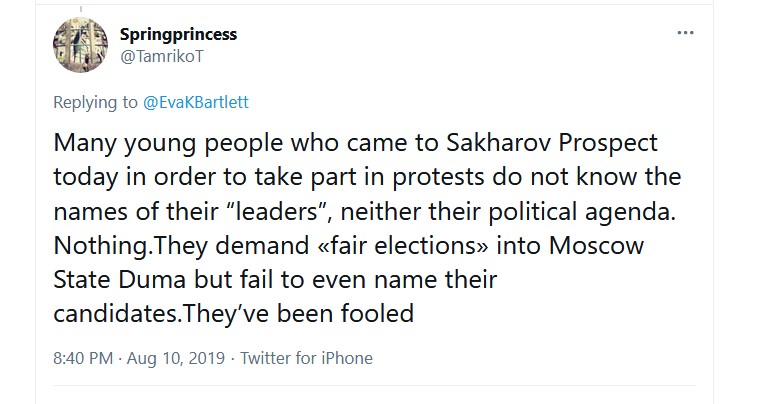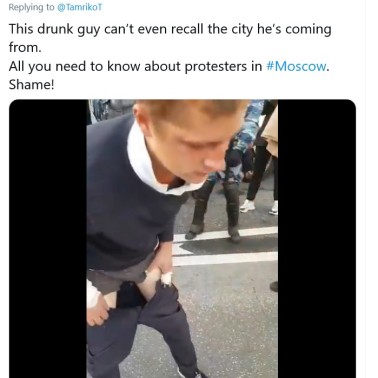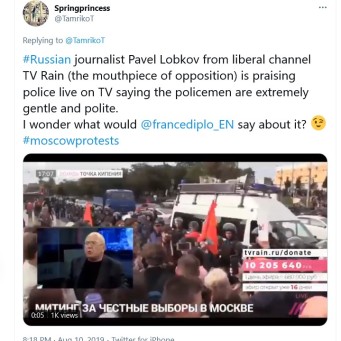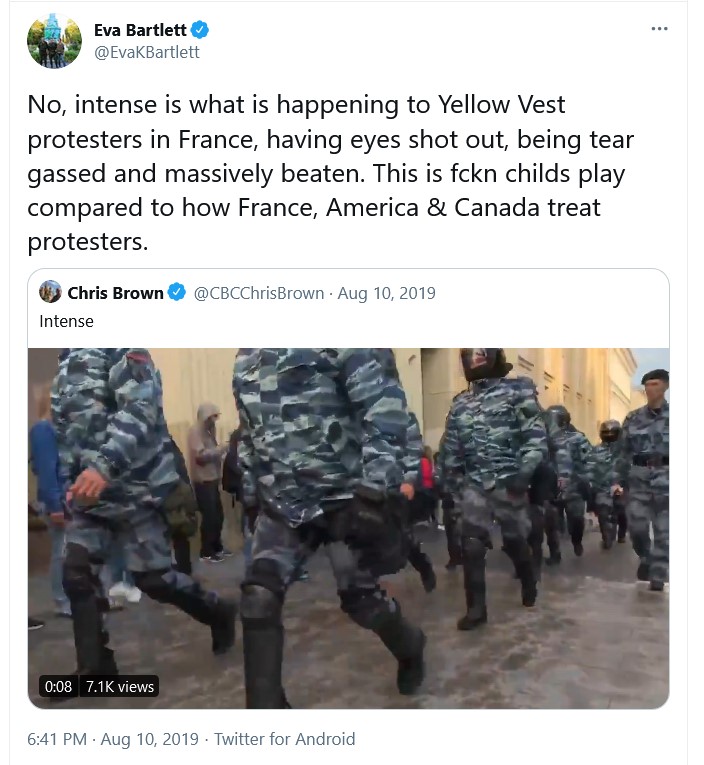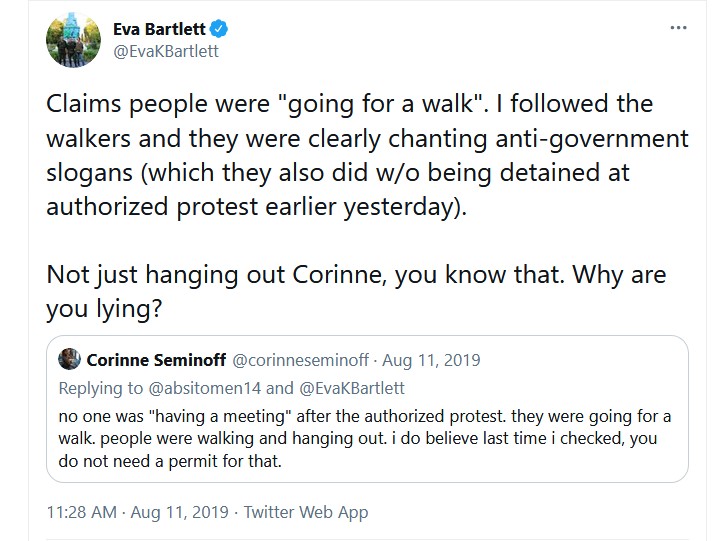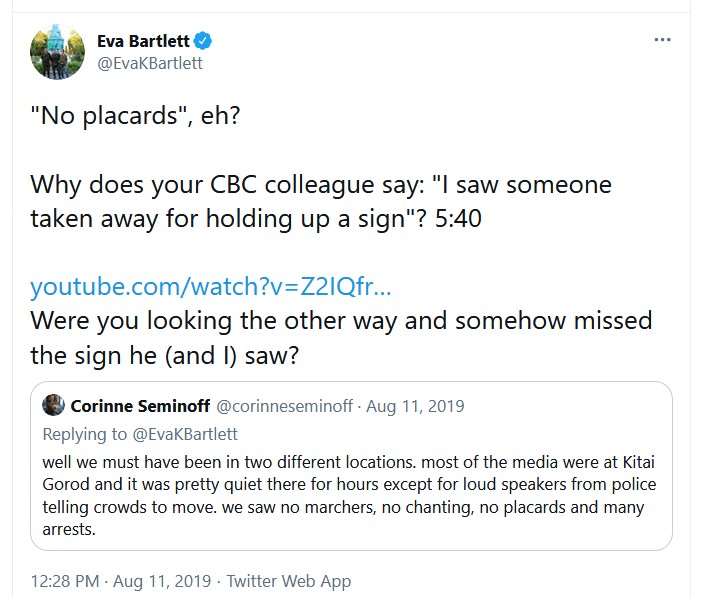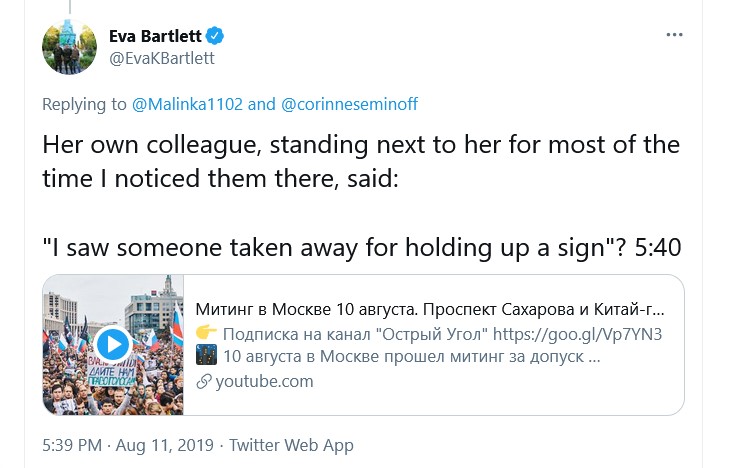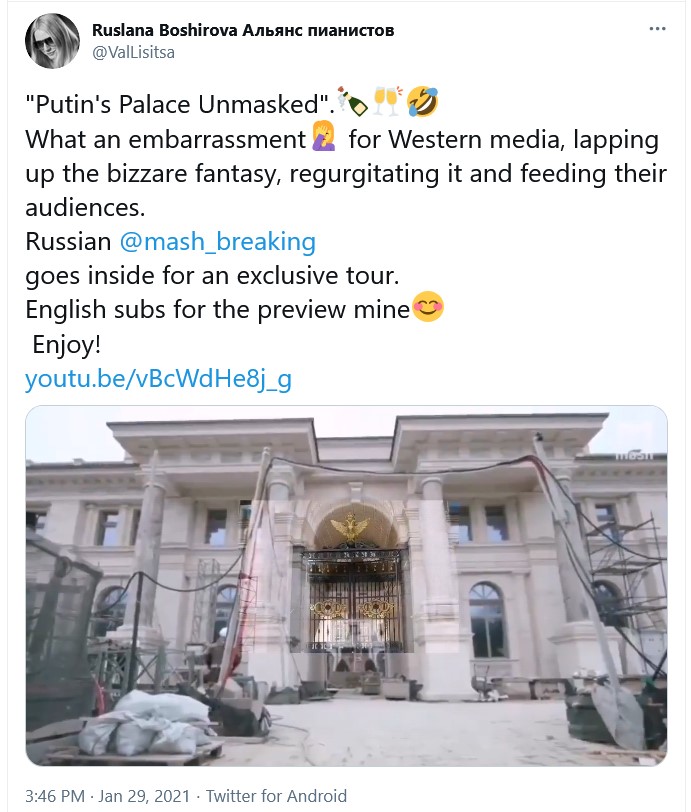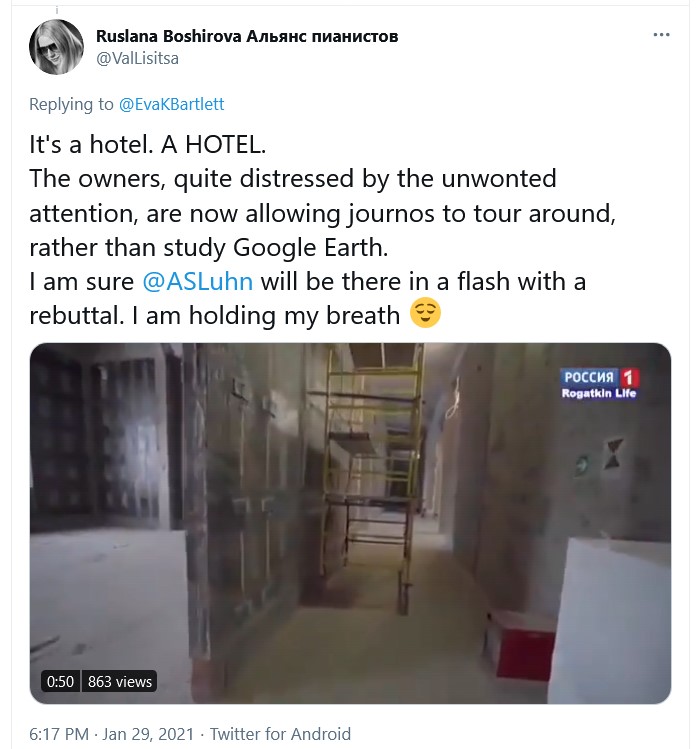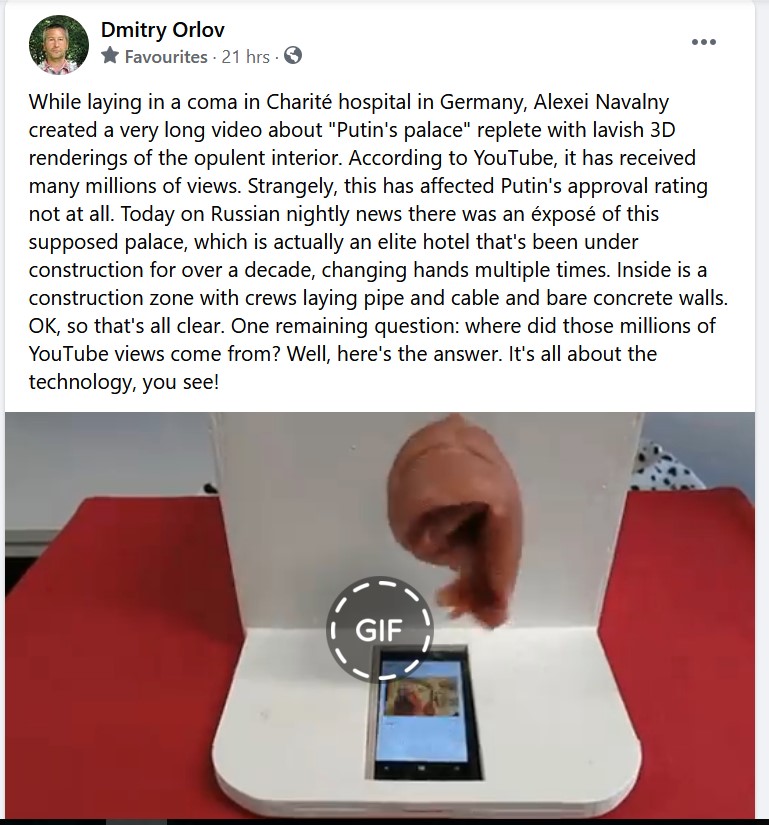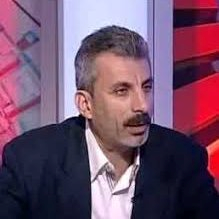February 28, 2021
Did they expect us to treat them with any respect?
Roger Waters (The Final Cut)
Long ago, I learned the hard way that what I call “professional ideologues” count every damn penny and I sure do NOT want you to post a full article of theirs, lest they threaten me with lawsuits (already happened twice): to them, money is far, far, more important than propagating any truths, believe me. So I won’t post the full thing here, just a link to it. You can read it there:
https://www.politico.eu/article/nord-stream-2-pipeline-has-damaged-the-west-enough-time-to-put-an-end-to-it/
What I do want to ask you, dear readers, do you think that these two clowns want their country to be treated with respect, or do they simply don’t care at all about things like dignity, respect, or honor? How about the people who voted for these kind of governments? Can’t they see how utterly pathetic it makes them look?
I met a lot of Poles and Ukrainians in my life and, if anything, I tend to find them mostly completely irrational about things pertaining to their national pride. The Ukies, apparently, even rather die than accept a Russian-made vaccine (ask yourself, in the Soviet era, how many bad vaccines did the USSR export to eastern European countries? The answer? Zero). As for the Poles, they fancy themselves as the future “Intermarium superpower”! And then they ask Trump to build them a US base for which they are even willing to pay for the military presence from a country which tries hard to blackmail Poland into paying for “Holocaust reparations”!
Dignity anybody?
And now this: their foreign ministers get together to beg Uncle Shmuel to protect them from North Stream 2. Just look at this great quote from the said article:
“We call on U.S. President Joe Biden to use all means at his disposal to prevent the project from completion“. (but do read the full thing, it is quite amazing).
Also, notice a typical “Polish wisdom”: seek out the protection of a (already agonizing) “ally” located thousands of miles away overseas, but do go directly against your two most powerful neighbors. Genius! Pure Polish genius!
To be fair, this could be seen as “progress”. After all, the biggest Polish hero, Jozef Pilsudski, was hoping to occupy Moscow with Nazi Germany. Asking Joe Biden for help against the accursed Russians is probably a tad smarter than asking Adolf Hitler. But not by much, not by much… (the outcome will be the same though).
The Polish and Ukrainian government have tried to turn total prostitution into a form of “resistance” against a “resurgent Russia”. Don’t they know how that makes them look in the eyes of the Russian people (most of whom don’t even want to use the Russian military to liberate Novorussia, nevermind “invading” 3B+PU!)?
To be honest, this further convinces me that Russia should simply forget about both these countries and deal with the many mentally sane countries on this planet (I explained that in some details here). On a personal level, I find most Poles very nice people, and I still do wish them (and the non-Nazi Ukrainians) well, but I also want my country to stop wasting *any* time, effort, energy, resources or patience with these countries. They want to be left alone? Great! I agree.
The Ukraine is a different problem: most Ukrainians are, basically southern Russians, and it is pretty clear that those in the East and the South will have to, sooner or later, liberate themselves from the (truly) Nazi Banderastan which came to power in 2014. I do believe, firmly, that Russia owes the Russian people of the Ukraine protection. But once the East and the South are free again, Russia should simply reduce her diplomatic presence in the Ukraine and Poland and bring to the absolute minimum, or even terminate, all deals, agreements, treaties, etc.
Oh sure, Russia will loose some markets and some money. Not that much though, not compared with the riches Russia has found in the South, the East and the North. Furthermore, if you look at the benefit/liability ratio from a Russian point of view, it is the entire “West” which is not worth the effort, especially the spineless and clueless EU. The USA, being a nuclear superpower, will remain an important interlocutor for Russia, agreed. But the rest of them? The UK? Canada?
I say, let Russia begin with the 3B+PU, sever ties with them first. Then, if Germany caves in and blocks the completion of NS2, I would server ties between Russia and Germany too. I would keep ties with southern European countries like Italy, Spain, Serbia, but even those really ought to be conditional on some kind two-way mutually beneficial outcome for both parties.
Bottom line: Russia owes nothing to her neighbors or, for that matter, to any country on the planet. She needs to always remember that.
I realize that the above might seem excessive to some, but judging by this interview of Lavrov (see below), I am inclined to think that even the most moderates of moderates are getting mighty fed up with the Europe, old and new.
The Saker
***
source
Vladimir Solovyov: Good afternoon, Mr Lavrov. Why was the EU High Representative for Foreign Affairs and Security Policy Josep Borrell “buried?”
Sergey Lavrov: Nobody “buried” Mr Borrell. He carried out the will of the EU member states. They determine EU policy. This is a lengthy and controversial process. On several occasions, some EU member states have told us in private that they are against sanctions and that they do not believe that Russia should be “punished” with sanctions. They know this is futile, but they act out of “solidarity,” or the consensus principle. I have said several times that as far as I understand it, the principle of consensus means that if someone disagrees, that means there’s no consensus. So far, I haven’t received an answer to this question.
Back to Mr Borrell, he was visiting us mindful of the complex environment surrounding his plans. Many were against his visit and publicly stated that he should not be going to Russia unless we “put right the wrongs.” In the end, they agreed upon the approaches that Mr Borrell was supposed to make known to us.
This is not the first time – and this applies not only to Mr Borrell, but to his predecessors as well (before him there was Federica Mogherini, and before her there was Catherine Ashton), they were unable to discuss things. When Mr Borrell read out the position regarding Mr Navalny, I put forward our counterarguments. The EU’s position is that we have made him a political prisoner, and this is unrelated to accusations against him. And that all of that constitutes a violation of human rights and Russia, as a party to numerous conventions on human rights, including the European Convention on Human Rights, must release him and respect his rights. But Russia has laws that must be respected. By the way, I notified the High Representative that if he presents this matter from this angle during a news conference, I will respond by mentioning the Catalans sentenced to 12 years or more in prison for organising the referendum on Catalonia’s independence. We were accused of organising this referendum, but no one presented a single piece of evidence, nothing even remotely close to the facts. So it happened.
With regard to human rights, I reminded Mr Borrell that we expressed our willingness to conduct a substantive dialogue on this matter a long time ago. However, first, it must be based on facts and, second, it needs to be a two-way street. If human rights are a recognised topic without borders, and states cannot hide behind their borders when discussing human rights, let’s agree on what human rights are. There’s a list of these rights, which are primarily socioeconomic rights. The right to life is the most important one. But the West strongly opposes the idea of discussing socioeconomic rights.
Vladimir Solovyov: Why do you deny Navalny and his brother the right to rip off the French company Yves Rocher?
Sergey Lavrov: This is what I told High Representative of the EU for Foreign Affairs and Security Policy Josep Borrell. I said that we did not pledge to protect those who did commercial damage to an EU company, Yves Rocher. There is factual information about this, about how the French company was lured to accept transportation and logistics services at 30 percent above the prices it had paid before, and how this was done by a one-man firm, which hired a subcontractor and transferred the money to the accounts of another company whose stakeholders are well known.
Vladimir Solovyov: And he did not give any response to that? Was he pretending not to understand you?
Sergey Lavrov: Mr Josep Borrell definitely has a clear understanding of the matter. But I would like to repeat that the High Representative of the EU for Foreign Affairs and Security Policy, however serious his title may sound, has no room for manoeuvre. He is acting within very tight limits.
Vladimir Solovyov: Did he make any positive suggestion, or was it just a call for surrender?
Sergey Lavrov: We ultimately found a constructive agenda. The High Representative himself proposed focusing on the subjects where we can help each other and find a balance of interests. These subjects are climate change, protecting the interests, economies and population of our countries to the best of our ability in the context of this natural hazard, as well as the issues of healthcare, science and technology. I believe that this is enough to make headway. I reminded him that we have been marking time for over two years on the extension of the Russian-EU intergovernmental agreement on cooperation in science and technology. The problem is that the EU wants the agreement to mention that Crimea is not part of the Russian Federation. The choice is between addressing the current aspects of our economic relations and promoting cutting-edge technology, and being stuck on this problem.
Vladimir Solovyov: Why has Europe decided that it can pose as a moral leader with a right to lecture us? Have they forgotten about the tragedy of Yugoslavia? And, speaking about Navalny, we can remind them about Julian Assange whom nobody is discussing any longer. You mentioned the three political prisoners in Spain, to which they have replied arrogantly that there are no political prisoners, only imprisoned politicians in Spain. Immediately after that, Carles Puigdemont remarked that there are not three but nine of them in Spain.
Sergey Lavrov: Incidentally, when all this happened, Carles Puigdemont and his associates were in Belgium, and several others were in Germany. The Belgian and German law authorities said the charges brought against them were politically motivated, but the Spanish authorities replied that they have their own laws, which must be respected. When I cited this argument during the meeting with High Representative Borrell, adding that we have our own laws as well, he started saying again that Navalny had been sentenced illegally, for political reasons, and that his rights had been infringed upon. We also talked about the rallies which Navalny and his team members, who are currently living abroad, organised actively and with provocative goals. Mr Borrell complained that a thousand people have been detained and many of them have been prosecuted, and that the right to peaceful protest is being rudely trampled on in Russia. He was especially concerned about the three expelled diplomats. His team told him about them while we were having lunch.
Vladimir Solovyov: He didn’t express his concern immediately, did he?
Sergey Lavrov: He told me when we were leaving the room that he was seriously concerned.
Vladimir Solovyov: Did you know that the diplomats were being expelled?
Sergey Lavrov: Yes, we knew this.
Vladimir Solovyov: It was not timed for Mr Borrell’s visit?
Sergey Lavrov: No, of course not. The decision was made when the identities of the diplomats who took part in protest rallies were established. And then they started wailing that the diplomats, who were just doing their job and carrying out their professional duty, had been detailed illegally and accused of what they did not do, that is, that they did not take part in the illegal rallies. We reminded them that the rally was not just unapproved and uncoordinated, but that its organisers did not even plan to request permission for it. Moreover, Leonid Volkov said publicly many times that they would not request permission but would simply take to the streets. In itself, this is more than just a breach of the law; it is an action designed to humiliate the state. If you believe that taking to the streets in this situation is your professional duty, you are not diplomats but provocateurs.
Vladimir Solovyov: Plus, no one has canceled the pandemic restrictions yet.
Sergey Lavrov: International conventions, including Vienna conventions of 1961 and 1963 on diplomatic and consular relations, bilateral conventions and, by all means, our conventions with Estonia and Sweden, firmly stipulate the fundamental truth that diplomats enjoy immunity and privileges, but must respect the host country’s laws and rules. The law was violated in the first place when the permit to hold a rally was not requested. The rules were violated as well since there is a presidential executive order and Moscow Mayor Sergey Sobyanin’s order on epidemiological restrictions that remain in effect. The same restrictions apply in St Petersburg and other cities. That is, both laws and rules have been violated.
Vladimir Solovyov: You also gave them a USB flash drive to keep them in the loop of what’s happening in Europe, didn’t you?
Sergey Lavrov: This flash drive can be updated literally daily. There’s a wave of protests in Poland now that are being brutally suppressed with batons and water cannons. The EU High Representative for Foreign Affairs and Security Policy said that he did not have the chance to watch the contents of the flash drive before his talks in Moscow, but promised to do so afterwards.
Vladimir Solovyov: Did you send it to him before the talks?
Sergey Lavrov: Yes, a couple of days in advance. I’m sure they watched it. The fact that he declined to discuss it saying he didn’t watch it goes to show that they realised they didn’t stand a chance in a candid dialogue with us. This awkward narrative from an arrogant standpoint, which was imposed on Mr Borrell in order for him to let it be known here, is being put into a certain philosophical and political context of the same geopolitical dimension. This is what happened when Josep Borrell was reporting back to the European Parliament and came up with the statements that Russia failed to live up to the expectations, a modern democratic society failed, economic ties with the EU collapsed, and we do not respect human rights and the like.
Vladimir Solovyov: Well, they are demanding that sanctions be imposed on us, aren’t they?
Sergey Lavrov: Yes, they are.
Vladimir Solovyov: I’m one of those who they want to see included on the sanctions list.
Sergey Lavrov: You are in good company.
Vladimir Solovyov: A good company, indeed. I will be the first journalist in history to be sanctioned against.
Sergey Lavrov: Not necessarily. That depends on what you call sanctions. RT and Sputnik correspondents cannot get an accreditation in Paris. I found out recently that one of our media outlets filed a lawsuit against the state for not being allowed to attend a news conference by President Vladimir Putin. Their argument was that, according to the law, if all the requirements are met, the accreditation must be provided. I’m not aware of these subtleties, but I know that this year’s news conference is being held in compliance with the pandemic requirements. It’s a fact that, without any coronavirus, RT and Sputnik, despite direct requests to the French government, were denied access to the Elysee Palace. Of course, we should also bear in mind the situation with Sputnik in Estonia, where criminal cases were opened against the journalists.
Vladimir Solovyov: Yes, our guys find it hard to work in the United States as well. Recently, White House press secretary Jennifer Psaki came up with a boatload of god-knows-what…
Sergey Lavrov: Yes, but getting back to the allegation that we disappointed the EU, failed to live up to their expectations and are moving away from Europe, having adopted a deliberate course on self-isolation… Well, this is some kind of a kingdom of crooked mirrors.
The problems between us and the EU began a long time ago. They were testing our patience and good will. When the Baltic states and other East European countries were admitted to the EU in 2004, we asked them if they were sure those countries were mature enough to be admitted as responsible members of this progressive association. We were told that, of course, they still have some holdover phobias from their past in the Soviet Union, but rest assured that as soon as they become EU and NATO members, they will calm down and no longer have reasons for these phobias. Nothing of the kind. The exact opposite happened and they became the most zealous Russophobes and are pushing the EU to adopt Russophobic positions. On many issues, the EU position dictated by solidarity is determined by an aggressive Russophobic minority.
Vladimir Solovyov: Why did they choose Germany and why Navalny?
Sergey Lavrov: I think he just came their way. It if was not Navalny, it would be something else. Clearly, he was being prepared for that quite seriously, if you think about preparations for the notorious film, which wouldn’t have been possible without the German authorities’ consent.
Vladimir Solovyov: Are you talking about personal data from the Stasi archives and Vladimir Putin’s photograph?
Sergey Lavrov: Yes, that too.
Vladimir Solovyov: But Maria Pevchikh, who had come from London to Moscow to accompany Navalny on his trip, during which she gave him his shirts, as Navalny said, and who allegedly brought back a certain water bottle, later disappeared.
Sergey Lavrov: She brought back more than one water bottle.
Vladimir Solovyov: In the process, they have either forgotten about the bottle or it has grown to the size of a whole water tank. She has openly accused you, saying that even the foreign minister doesn’t know that these documents are available in open access, that it is enough to write a letter.
Sergey Lavrov: She has even said, if I remember correctly, that she has filed such a request.
Vladimir Solovyov: Not so simple. She said that only a German citizen can do this. This makes one wonder who Maria Pevchikh is.
Sergey Lavrov: I have heard debates on this issue on the Rossiya channel.
Vladimir Solovyov: Thanks for watching us.
Sergey Lavrov: I can’t go to sleep otherwise.
Vladimir Solovyov: So much for the secret of ratings: dropping off with your TV set on.
Sergey Lavrov: To begin with, Maria Pevchikh has surrounded herself with mystery. Our German colleagues are helping her to keep up that mystery. First of all, nobody has seen her after she left on board that plane. The Russian Prosecutor General’s Office has bombarded its German colleagues with requests to honour their commitments under the agreements on assistance in legal matters. In particular, we also requested a meeting with Maria Pevchikh, to which our German colleagues replied that they don’t know her whereabouts. However, she wrote herself in social media that she had met with Navalny in Germany.
Vladimir Solovyov: She gave interviews.
Sergey Lavrov: Yes, she did. Navalny had several German security agents with him round the clock. We told the Germans about this, that she had been among the people at Berlin airport who came to see Navalny off before his flight to Moscow on January 17, 2021. But they don’t even allow us to talk with the doctors who provided medical treatment to Navalny and found traces of toxic agents in his samples.
Vladimir Solovyov: But the doctors didn’t find anything.
Sergey Lavrov: No, I mean the Bundeswehr doctors. They are doctors as well. We have pointed out on numerous occasions that if the Omsk doctors did not find anything, and the Charité doctors didn’t either, then the Charité doctors can also be accused of concealing evidence of Navalny’s poisoning.
A great deal has been said about the Bundeswehr. This does no credit to Germany as a country with a responsible attitude to its international commitments. First, they said there was one water bottle, and the request of the Prosecutor General’s Office mentioned it. Suddenly, they forgot about the bottle and started talking about clothing. Then they brought up the bottles again, this time three of them, claiming that traces of a toxic agent had been found on two of them. But the Germans, just as the French and Swedish experts who were allegedly asked to double check the results of German tests, and the Technical Secretariat of the Organisation for the Prohibition of Chemical Weapons (OPCW) have not provided any information to us. They have refused to do this.
Vladimir Solovyov: I have read the OPCW’s report. It said plainly that they did not find any traces of a toxic agent but only “biomarkers of the cholinesterase inhibitor” in Navalny’s samples, which are not identical but “have similar structural characteristics” with certain toxic chemicals. And the report further says that this cholinesterase inhibitor is not on the list of toxic agents. Why do they keep saying “Novichok” and “toxic agent” then? The OPCW report doesn’t say so.
Sergey Lavrov: We have been told since the Skripal case that only the Soviet Union, and hence Russia, has the Novichok production technology. They completely disregard the facts which we provide and which are available in open access to the effect that over a hundred inventions related to the so-called Novichok formula have been registered in the United States.
Vladimir Solovyov: If I remember correctly, Hillary Clinton has confirmed this.
Sergey Lavrov: Yes, of course.
Vladimir Solovyov: This has also been confirmed by the Czech President.
Sergey Lavrov: True. Moreover, during the story with the Skripals’ poisoning, Germany was one of those who pointed the finger at us, saying that no other country could have the Novichok production technology. When the Bundeswehr found the traces of a substance similar to Novichok in Navalny’s samples, we asked them how they had been able to determine this if they told us themselves that they had never conducted such research. No reply.
Just note that the point at issue is not Navalny. This is not just a coordinated Western campaign of deterring Russia, but a campaign of aggressive deterrence.
Vladimir Solovyov: Why?
Sergey Lavrov: Because they don’t like it that we have our own views on global developments and that we openly express them and take practical actions to uphold them, unlike a huge number of other countries who have their own views as well but keep mum. I have talked with many ministers and other officials, as well as with members of civil society, who say that they don’t like what the West is doing.
Vladimir Solovyov: Are they afraid to say so?
Sergey Lavrov: Of course, they are. They are tied to the dollar, investments, and the children whose studies abroad are paid for with the money they keep there. It is a major damper on the elite’s ability to speak their minds. But we have no right to remain silent. Our history, our ancestors and our genetic blueprint do not allow us to stomach insults or unilateral attempts to dominate all and everything.
Vladimir Solovyov: I’m aware of what you personally think about this, so I can imagine your indignation caused by Navalny’s behaviour in court with regard to the veteran and this act of bullying … But the West turned a blind eye to this, too. After all, their emissaries were sitting in the courtroom and watching their underling do his thing.
Sergey Lavrov: Representatives of the embassies of Great Britain and France attended this particular court session. They were our allies during World War II. I will not even comment on this. Any decent person can clearly see what is going on. Returning to why it’s Navalny and not anything else, this “case,” in today’s parlance, is a deliberate act. The date of his return and the date of releasing the film make it all too obvious. But, look, now that there’s a wave of attacks on Russia, no one is talking about the “poisoning.” What they are saying is that Navalny has been illegally convicted and must be set free.
Vladimir Solovyov: This has already become imprinted in the public consciousness. This is a lie that has already taken root, same as with the Skripals.
Sergey Lavrov: That is why we will keep asking them questions. Recently, I received an open letter from Mr Kozak, a researcher, a biologist who lives in Switzerland. I answered him.
Literally today, we will be sending an official inquiry to the OPCW, Germany, France and Sweden with a request for them to comment on his findings made on the basis of the publications substantiating and analysing what happened to Navalny, the biomaterials that were obtained from him and tested in the West. From a purely scientific standpoint, he raises a number of questions related to biological and chemical science.
Vladimir Solovyov: I have read Mr Kozak’s papers and your answer. Interestingly, the Lancet documents show a blood test with lithium in it. I started looking closely at various papers on lithium and talked with the professionals. Interestingly, there have been several studies reporting the effect of excess lithium intake on cholinesterase inhibitors. It’s complicated. I’m not even talking about the diseases that are treated with lithium. Clearly, we need to consult psychiatrists about this. However, the complete silence from the other side is surprising. I don’t think Germany is a random choice. At one time, George Friedman from Stratfor wrote that the alliance between Russia and Germany represented an existential threat to the United States. The goal is to prevent an improvement in relations between our two countries. No one expected Germany to be part of this direct attack on Russia. After all, Navalny wasn’t taken to Porton Down in the UK. Germany was their first choice.
Surprisingly, this film, if we are talking about Gelendzhik, managed not to tell a single word of truth. Everything is 3D imagery. But the West got infected with this lie. They are doing their best not to see this debunked.
Sergey Lavrov: I’m sure that the United States does not need us to have good relations with Germany. The same goes for European countries. Britain doesn’t need this either. Just like the West didn’t need a united Germany at one time. The Soviet Union was the main proponent of a unified Germany.
Vladimir Solovyov: First, the preservation of Germany.
Sergey Lavrov: Yes. I’m already talking about modern times. The West was very worried back then and reluctantly agreed on reunifying Germany. We operated on the belief that the German people have the right to be one nation which is its historical destiny as a nation. Here’s something (which is funny) about double standards. When I mentioned this at the Munich Security Conference in 2015 and said that we were doing it then deliberately, understanding the German people’s aspirations, and stressed that it would be important for other countries to treat Crimea’s reunification with Russia in about the same vein – as a manifestation of the people’s will. There was a referendum in Crimea, but there was no referendum in Germany. The audience had a fit of hysterics. The German deputies yelled things like “How dare you compare these things!?” I can see this arrogance on the part of the Germans in recent years. You know, there is such a subtext. They are not saying it out loud, but the message is clear: “Dear friends, we have paid our bills, and we owe nothing to anyone anymore.”
Vladimir Solovyov: Hence, the revision of WWII outcomes and the attempt to equate the Soviet Union to Nazi Germany.
Sergey Lavrov: That’s true. A fairly large portion of their elite is pursuing this policy. There are people who want Germany to lose its every chance to enjoy normal cooperation with us. At the same time, there are still voices of sanity there. Recently, President of the Federal Republic of Germany Frank-Walter Steinmeier said it was always better to discuss things, to be mindful of the future and to operate based on national interests when tackling the most challenging issues. So far, he has been the only foreign politician to mention our past. He said that 2021 marked 80 years since Nazi Germany’s invasion of the Soviet Union. This is nothing short of political courage in modern Germany.
There are a number of public organisations, such as Potsdam Meetings, or the St Petersburg Dialogue forum. This date cannot go unnoticed. When Vladimir Putin was elected President for the first time, we declared the historic reconciliation of our nations. Now, when they are trying to pit us against each other (there are people who want to do so within Germany and outside it), this date could serve as an important psychological message to the effect that confrontational logic must be abandoned and everything should not be seen as an opportunity to impose more sanctions on Russia.
Speaking in the Bundestag, my German colleague Foreign Minister Heiko Maas said that Nord Stream 2 must be preserved, but only in order to have a lever to control Russia. Here again comes the logic of “who has an influence on whom.” It seems to me that the Soviet and Russian energy projects in Europe have always been a material foundation for positive interdependence. It’s always good when the countries depend on each other in terms of the economy. It makes overcoming many other issues easier. Mr Maas then said that Germany should consider sanctions against Russia over the case of Navalny, and “it’s okay” that they failed to achieve their goal earlier. Most importantly, a signal would be given that Moscow’s actions would not go unnoticed. Sanctions are imposed in order to feel satisfaction from the act of meting out “punishment.” But sanctions lead nowhere and cannot result in a change in our course on upholding our national interests.
Vladimir Solovyov: They lead to consolidation of our society.
Sergey Lavrov: What I’m saying is that they are not conducive to achieving the goals that the West has set for us.
Vladimir Solovyov: They do not understand our logic, our society. For example, Yulia Navalnaya suddenly flies to Germany, despite the coronavirus restrictions.
Sergey Lavrov: I’ve read about it. We could ask the Germans if they know anything about the special rules created for her. But they won’t answer. I think there is no need to ask until this story acquires a dimension that affects our legitimate requirement of the Germans to explain what exactly they found in Alexey Navalny’s tests.
Vladimir Solovyov: They do not even bother to enter into a dialogue with us.
Sergey Lavrov: They have no arguments, but we will not leave it at this.
Vladimir Solovyov: In this whole situation, I am most concerned about Donbass. Russia, as one of the guarantors of the Minsk Agreements, has no other choice but to maintain dialogue with our German and French colleagues. Apparently, they have lost sight of their role in this dialogue, and no longer know why they are even there. The war in Donbass has been going on for seven years. This is not a direct function of the Russian Foreign Ministry, but it’s a tragedy for those people. And you have to look your colleagues in the eye all this time. They don’t seem to want anything there, just waiting for a change of government in Russia. They think we are oblivious to it, and will play their game.
Sergey Lavrov: This is a sad story, and every day it is taking on a more and more perverse nature. Paris and Berlin now almost unquestioningly demand that issues be resolved in the Normandy format only, which means without Donbass. We argue that the Minsk agreements say that the Contact Group formed under those agreements should resolve issues directly between Kiev, Donetsk and Lugansk. They tell us no, the Contact Group plays a supporting role, while everything will be decided in the Normandy format, and Donetsk and Lugansk will be given ready-made solutions. It is a lousy position with regard to the people who were declared terrorists, although they never attacked anyone. They are still considered terrorists only because they have expressed dissatisfaction with what was happening in Kiev, and declared its moves unconstitutional, and asked to be left alone. They were actually attacked by the illegal regime that came to power as a result of a coup d’etat.
The West stomached it all: the coup itself, and its instigators’ new Russophobic approach to the Russian language in Ukraine, or their banish-everything-Russian-from-Crimea rhetoric. In response to this, the people revolted, on a political plane. Donbass said it wanted to be independent, and later agreed to negotiations, and Crimea voted for reunification with Russia. The Russophobic wave that brought with it the geopolitical changes in Ukraine and Crimea had been approved by the West, or at least the West did not object to it and even encouraged it to a certain extent. But Russia has been punished for it.
Vladimir Solovyov: But we put up with this for some reason. For some reason, we cannot just tell them that if they are not going to fulfil the Minsk agreements, then we will decide the fate of the Russian people there. It is our legitimate right to protect the interests of our compatriots.
Sergey Lavrov: We are protecting them. Not only in Ukraine, but also in the Baltics, and in other countries. This is not even helplessness on the part of the EU. I think it is a conscious policy of turning a blind eye to Russians being persecuted, be it the media or the Russian-speaking population. In the Baltics, they are denied access to information in their native language, contrary to what is guaranteed under the local laws and international conventions. This attitude to the Russian language problems in the European Union, as well as their stories that they have their own mechanisms and will use them to influence the situation, it is all lies. They will not do anything, will not lift a finger to bring the Baltics to their senses and make them stop their Russophobic hysteria. I could not even imagine this.
But let’s go back to Ukraine. We are interested in keeping the Minsk agreements on the table. They were approved by the UN Security Council and contain arrangements that are very difficult to abandon.
Vladimir Solovyov: They are not complying.
Sergey Lavrov: They are not. This means that Donbass is living the way it does now. As you may recall, with regard to the Minsk agreements and the compliance mechanism in the Contact Group and the Normandy format, we have repeatedly accepted a compromise, such as the Steinmeier formula. Originally, the Minsk agreements required that Donbass be given a special status and then the election be held. The Steinmeier formula stipulates gradual provision of this status.
Vladimir Solovyov: Why go meet them halfway if they take it for granted and never reciprocate? I know you are a diplomat, and I’m a proponent of forceful solutions.
Sergey Lavrov: I’ll give you an example. Take, for instance, the repeated and gross violation of the UN Charter by the United States and its allies. However, no one is suggesting that we leave the UN and tear up our signature under the UN Charter. If there’s a completely “unkillable” document and someone is trying to justify their non-compliance with ludicrous assurances, we benefit from it diplomatically.
Vladimir Solovyov: We can stay. But maybe we need to act in a completely different way.
Sergey Lavrov: How? Life takes its own course. Donbass has learned to live in a situation of illegitimate blockade, which the French and the Germans “refuse to see.” Instead, they pester us with a demand to open two more checkpoints. But this is not about lifting the blockade. The Minsk agreements are not talking about the checkpoints, but complete unblocking of economic ties.
Vladimir Solovyov: Why talk to them at all? They themselves do not decide anything. We need to talk directly with the Americans.
Sergey Lavrov: I think it would be the wrong thing to do. We exchanged views with the Americans on Ukraine when they had a special representative for this conflict. I don’t think we should call on the United States to influence their “underlings” and say that we have no use for the Minsk agreements.
Vladimir Solovyov: They themselves do not decide anything. There’s even no point in memorising the name of yet another of their foreign ministers.
Sergey Lavrov: The process that we are now observing with it being mandatory that the Minsk agreements are kept on the table means that the discrediting of the Ukrainian leadership is in full swing.
Vladimir Solovyov: You are playing chess with them, and they are playing checkers with you.
Sergey Lavrov: We are not playing chess with them. We are not talking to them altogether. Here are the Minsk agreements. Go ahead and comply with them. Period.
Vladimir Solovyov: I like that. No extra motions. What if they don’t comply?
Sergey Lavrov: Let them explain to their own public why they are not doing so.
Vladimir Solovyov: In their own country, they explain that it is normal to close three channels, with sanctions imposed on one of their own citizens, a deputy of the Verkhovna Rada.
Sergey Lavrov: The Americans said that this was the right thing to do. Europe mumbled something (sorry for this non-diplomatic term) to the effect that they will look into it. What is there to look into? Freedom of speech is either there or it is not.
Vladimir Solovyov: There is no freedom of speech.
Sergey Lavrov: Ukraine wants the Minsk agreements to cease to exist. Let them say so themselves. President Zelensky says that the Minsk agreements are bad, but they help keep sanctions on Russia in place. We are telling the Germans and the French: you wrote down that you would resume normal communication with Russia once it fulfilled the Minsk agreements, even though there’s no mention of us there. They talk only about Kiev, Donetsk and Lugansk. So, if they keep intact their five principles requiring Moscow to fulfil the Minsk agreements, President Zelensky will respond that way. He is not doing anything. They say Russia must comply, but the sanctions remain in place which makes him happy.
Frankly, I’m even happy with that sanctions situation. Not fully yet, but we have realised that we must rely only on ourselves. No, we do not want to self-isolate. We want to take advantage of the international division of labour, but if someone is saying that there will be competition, but we will be “cut off” here, here and also there… As Minister Maas put it, they will impose sanctions just to make sure our actions don’t go unnoticed. What kind of a reliable partner are you then?
Vladimir Solovyov: This phrase hurt their feelings.
Sergey Lavrov: First, we said this not one year ago, but a couple of years ago, when the sanctions were being imposed and import substitution was discussed. Then, they began to wail about why we were responding to the sanctions, meaning that they had good reasons to impose them, while we didn’t. It was stunning to see them act like schoolchildren rather than politicians.
I read excerpts from the foreign press. The German Süddeutsche Zeitung wrote a couple of days ago that it is necessary to think twice before acting emotionally and imposing “sanctions for the sake of sanctions,” because the punishing side must understand that they also pose a threat to it, as it ceases to be a reliable partner. So, we are not alone in drawing such conclusions, which I put my name down for.
Vladimir Solovyov: Are we heading for a breach with the EU?
Sergey Lavrov: We believe we would be ready for this. We are neighbours. Speaking collectively, they are our largest trade and investment partner. Many EU companies operate here; there are hundreds or even thousands of joint ventures. When a business benefits both sides, we will continue. I am sure that we have become fully self-sufficient in the defence sphere. We must also attain the same position in the economy to be able to act accordingly if we see again (we have seen this more than once) that sanctions are imposed in a sphere where they can create risks for our economy, including in the most sensitive areas such as the supply of component parts. We don’t want to be isolated from the world, but we must be prepared for this. If you want peace, prepare for war.
Vladimir Solovyov: It should be said that our coronavirus vaccine has come as a blow to them. They never expected this to happen. It turns out that they don’t know anything about Russia and don’t understand it. They are shocked to see that our economy is not in tatters, and that we have [advanced] research and scientists.
Sergey Lavrov: It was Barack Obama who said that Russia’s economy was in tatters. They haven’t learned from others’ mistakes. And it appears that they are unable to learn from their own mistakes either.
Vladimir Solovyov: Will you miss President Donald Trump?
Sergey Lavrov: He is an outstanding person. I remember my two meetings with him, once when I was on a visit to Washington, and also the talks he had with President Vladimir Putin, which I attended.
Donald Trump is a remarkable politician acting from his own experience. Where there is benefit, everything must be done to maximise it; where there is no benefit, let things take their course.
As for respect for our, Spanish or American laws, I am shocked by the impeachment proceedings. The charges brought against him… You can watch and listen to Trump’s video addresses again and again…
Vladimir Solovyov: And find nothing criminal in them?
Sergey Lavrov: Yes. Just compare them to what Leonid Volkov or Vladimir Ashurkov are saying. As many people say, have they ever urged young people and children to take to the streets? No, they have not. But I have heard them say, “What’s wrong with this?”
Vladimir Solovyov: Right. This is exactly what Volkov said.
Sergey Lavrov: They believe that if children want to join a protest rally, there is nothing wrong with it. This means that they are becoming part of civil society.
Vladimir Solovyov: During his meetings with foreign secret agents, Vladimir Ashurkov asked for $10-$20 million and offered to share information about a Russian bank [allegedly involved in corruption].
Sergey Lavrov: We have exposed this. But it’s like talking to a brick wall. The West doesn’t see this, just as it pays no attention to our arguments on the alleged poisoning at this point. They just want our repentance.
Vladimir Solovyov: But we have changed as well, haven’t we? We no longer react as nervously as we did before. I am concerned about you. The newly appointed US Secretary of State Antony Blinken is the ninth US Secretary of State you will be working with. You said that you have to recite the history of Russian-US relations to every new appointee.
Sergey Lavrov: This reminds me of an old phrase, “You are my first.” I have had a conversation with Antony Blinken. I believe it was a normal conversation. We agreed that there are many problems between us.
Vladimir Solovyov: Have you agreed not to agree?
Sergey Lavrov: Yes, we can hardly agree on the majority of these problems. But it is clearly inevitable that we must continue our dialogue on strategic stability and try to mend the damage done by the “disarmament experts” of the previous US administration. An agreement has been reached on extending the New Strategic Arms Reduction Treaty (New START).
Vladimir Solovyov: But our position remained unchanged, didn’t it? It was the Americans who hesitated, not us?
Sergey Lavrov: Yes, it is unchanged.
As to how our foreign policy activities are being covered by some media, a few neoliberal journalists wrote that as soon as US President Joe Biden snapped his fingers, Russian President Vladimir Putin immediately signed a deal to extend the New START Treaty. The problem was resolved that same day, although before that, the Russian Foreign Ministry had said that it required a lengthy procedure under our laws (several weeks). So it was all a lie, they concluded.
I will not reveal any big secrets. I will just say we hoped common sense would prevail with the President of the United States Joe Biden. A few weeks before his inauguration, we made all the preparations required under our legislation to conclude an agreement to extend the New START Treaty.
Vladimir Solovyov: Joe Biden said last summer that this was one of his top priorities.
Sergey Lavrov: It was not 100 percent guaranteed.
Vladimir Solovyov: But he talked about it.
Sergey Lavrov: In other words, we simply prepared beforehand for an optimistic scenario to avoid time trouble. It is just that sometimes our commitment to extension of the Treaty is shown in a perverse way – like they say, Joe Biden proposed it, and Vladimir Putin agreed.
Vladimir Solovyov: Care for a conspiracy theory?
Sergey Lavrov: Go on.
Vladimir Solovyov: How about Vladimir Putin helped replace Donald Trump with Joe Biden because Trump did not agree to extend the New START?
Sergey Lavrov: Possibly. I am sure this is what happened. I can say just one thing to all those who are looking for an intrigue in who is more important, or whether Russia is doing America’s or someone else’s bidding. In fact, Russian President Vladimir Putin does not really care who will take all the credit later. If we reach an agreement that will be good, useful, and important for us and for the whole world – be it on disarmament or on something else – it’s our pleasure.
Vladimir Solovyov: Mr Lavrov, where does your freedom end? And where does it begin? The Constitution says that the President determines the country’s foreign policy.
Sergey Lavrov: My freedom ends where another’s begins. This is not from the Constitution, though.
Vladimir Solovyov: How free are you in foreign policy matters?
Sergey Lavrov: There’s the Foreign Policy Concept of the Russian Federation which was updated several years ago. It was approved by the President. We have doctrinal documents covering regional geographic areas. They are classified, just like in any other country, but are based on the publicly available Foreign Policy Concept.
In addition to geographical areas, whose doctrinal documents are also approved by the President, there are areas such as strategic stability, arms control, etc. This is also reported to the President collectively by all departments involved, such as security services, the Defence Ministry and the Security Council. Once a common policy is coordinated, that’s what guides action.
Vladimir Solovyov: Your every step isn’t supervised?
Sergey Lavrov: No. The President trusts me. If we have a directive that he approved, be it in foreign policy or elsewhere, you must act independently to achieve the goals it sets. Whether you succeed or not is a separate matter.
In case of unconventional situations that are not covered by the established approaches, we have weekly, or more frequent, meetings of the Security Council permanent members where we openly discuss these matters. It is always a collegial decision.
Vladimir Solovyov: Is there enough time for FC Spartak?
Sergey Lavrov: The winter pause is about to come to an end… I miss it.
Vladimir Solovyov: Do you still play football?
Sergey Lavrov: Yes, on Sundays. Last Sunday, we played outdoors despite the fact that it was 15 degrees below zero.
Vladimir Solovyov: Did you score?
Sergey Lavrov: I’m embarrassed to say … yes! But I like assists better.
Vladimir Solovyov: Like Lionel Messi?
Sergey Lavrov: Messi is a great scorer too.
Vladimir Solovyov: Yes, but he also likes to pass the ball.
Sergey Lavrov: True.
Vladimir Solovyov: Rafts? Rafting?
Sergey Lavrov: Well, not in winter… In summer, yes.
Vladimir Solovyov: Poetry?
Sergey Lavrov: Honestly, no real poetry for a very long time now. For now, I make do with epigrams for my friends’ birthdays. The elevated stuff isn’t coming as easily.
Vladimir Solovyov: The current Russian Government has a quite a few talented writers.
Sergey Lavrov: Do they write poetry? Or…
Vladimir Solovyov: Poetry. Not writing each other up.
Sergey Lavrov: I didn’t know that. I know that Arkady Dvorkovich wrote poetry when he worked in the Government, and he continues to write, probably. Prime Minister Mishustin wrote lyrics for many popular pieces of music. It’s a romantic way to escape. However, it shouldn’t create the impression that we are romantics in practical matters. We are realists.
Vladimir Solovyov: Hard-nosed?
Sergey Lavrov: You could say that. A healthy dose of cynicism has never been a bad thing in politics.
Vladimir Solovyov: Do you prepare your memorable quips in advance? Or do they just come out on their own and “kill” on the spot? Some have become legendary, although you deny authorship.
Sergey Lavrov: The words were accurate but a different order. If you are thinking what I’m thinking.
Vladimir Solovyov: You said to former British Foreign Secretary David Miliband: “Who are you to lecture me?”
Sergey Lavrov: Well, how do you prepare jokes in advance? I’m not saying that I take after Viktor Chernomyrdin, who never prepared his jokes in advance. With him it was like a force of nature. No, I do not prepare my jokes in advance.
Vladimir Solovyov: Do you ever make friends with your international colleagues when you feel like you get each other?
Sergey Lavrov: There are quite a few of them. I am afraid to list them.
Vladimir Solovyov: So they won’t be hounded?
Sergey Lavrov: Many of them hold very high posts in the European Union. They are good guys. I don’t want to give them up.
Vladimir Solovyov: Has it really become that bad?
Sergey Lavrov: I think so. We are “toxic” after all. I mean for them.
Vladimir Solovyov: Us? I think it’s the other way round: we are the only ones who follow their principles.
Sergey Lavrov: They think we are “toxic” but we don’t care. If they want cordial working relationships (President of Russia Vladimir Putin and the Foreign Ministry have said this many times), the foundation has to be mutual respect, not interfering in each other’s internal affairs, and cooperating on issues of mutual interest. Striking a balance between our interests is the only possible outcome of such talks, not merely our consent to their proposals.
Vladimir Solovyov: Do the personal attacks, insults and attempts to smear your family members get to you?
Sergey Lavrov: I don’t read about it myself. Sometimes, a well-meaning person will draw my attention to it. For example, six or seven months ago I was shown a report (anonymously sourced as always) about an illegitimate son of mine who works in the Foreign Ministry’s facilities department.
Vladimir Solovyov: What a pleasant surprise!
Sergey Lavrov: But he doesn’t come to see his dad. Apparently, he makes good money.
Vladimir Solovyov: You are really fortunate to be able to take such a light and ironic attitude to it all. So, they don’t succeed because you don’t let it get to you?
Sergey Lavrov: I don’t think any member of the Government, not to mention the Foreign Minister, should let themselves get rattled. To be honest, I find it easy to deal with. But those who take it harder must keep their perfectly justified feelings to themselves.
As the old Hollywood saying goes, “Never let them see you sweat.”
Vladimir Solovyov: Thank you, Mr Lavrov.
Sergey Lavrov: Thank you for a very interesting conversation.
Filed under: EU, Europe, Germany, Poland, Russia, Ukraine, USSR | Tagged: Alexei Navalny, Lavrov, The Saker | Comments Off on Do these countries really want to be respected?















